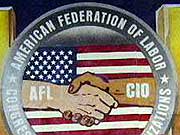Nearly 20 years later, the Hormel strike lives on
January 29, 2004
 |
| Austin-based Hormel Foods was the scene of one of the state's most bitter strikes. In August, 1985, more than 1,000 meatpackers walked off the job, protesting shrinking wages and plant safety issues. The workers stayed on strike well into the following year. (MPR Photo/Erin Galbally) |
Austin, Minn. — Charlie Valdahl sits in his sun-drenched living room in a well-kept Austin neighborhood. Valdahl is retired, but he can easily reel off the various jobs he did during his long career as Hormel meat packer.
"I was a ham boner, a pick-dick boner, miscellaneous," says Valdahl. "I used a knife for probably 30 years I guess -- probably 30 years out of the roughly 42 years I was there."
 | |||
It was arduous, dangerous work, butchering hogs on a fast-moving line using extremely sharp knives. Many workers began suffering from carpal tunnel syndrome caused by having to grip their cleavers, knives, and saws, which were greasy with blood and fat.
Then the company cut wages. Contract negotiations with the union Local P-9 collapsed. The workers went on strike.
"You tend to use -- almost like the birth of Christ -- before the strike and after the strike," Valdahl says.
By the time the strike of 1985 hit, Valdahl had spent more than three decades working for Austin's largest employer. He was 56. Many of his friends had already retired, with younger workers like Allan Wesely swelling the ranks.
At the time of the strike, Wesely was completing his third year in the plant's dry sausage division. He was in his 30s, with two young daughters at home. Wesely was active in Local P-9.
He supported the strike from the start. Soon, Wesely was traveling the country, trying to drum up support for the strikers back at home.
|
It was a bitter struggle. I knew I would have to go back and work hand-in-hand with many of the people that didn't want to work hand-in-hand with me.
- Allan Wesely, former Hormel employee |
"I was what I guess you would call an activist, because I was one that was willing to do whatever I could to help the situation," says Wesely. "I wasn't working my regular job. Therefore, to get back to that job I needed to do what I could to do help -- that's how I felt about it."
For his part, Charlie Valdahl was less enthusiastic about the strike. He disagreed with the local union leadership. And he began to meet with P-9's parent organization, the United Food and Commercial Workers Union, which eventually withdrew its support for the strike.
All told, Valdahl says he spent about six months on the picket line. Finally, he decided it was time to return to work.
"On January 16 (1986), Martin Luther King Day, I took my sack lunch and I drove through the picket line, which was harder than getting on the boat to go overseas, I'll tell you," says Valdahl. "Then as it turned out, being Martin Luther King (Day), all of the other unions came down from the Cities along with everyone else, and we were locked in. They wouldn't let those of us that were back there out of the plant."
For Valdahl, that was the start of late-night phone calls accusing him of being a scab. It was also the end of several long friendships with those still on the picket line.
About a week after Valdahl crossed, on Jan. 21, Minnesota Gov. Rudy Perpich called in the National Guard. They lined up in full riot gear just outside the Austin plant. They made sure replacement workers could come and go easily. For Allan Wesely, it was the beginning of the end.
 | |||
"It was a very cold morning. You could see the frost as they marched. We thought this was probably a lot of overkill, but I think it was the first time I heard any of our membership feel that they were not safe as picketers on the picket line. They felt threatened at that point," Wesely recalls. "Local law enforcement only met whatever force they needed to, with whatever force they had to. We weren't sure about that with the National Guard."
By June 1986, the national union ousted the Local P-9 leadership, essentially putting an end to the strike. By that fall, workers ratified a new contract.
Allan Wesely never returned to Hormel.
"It was a bitter struggle. I knew I would have to go back and work hand-in-hand with many of the people that didn't want to work hand-in-hand with me," says Wesely. "But again, it's a very hard job. And I would be the first one to tell you, even today, the people that work over there earn every nickel they get. I just thought there was life after Hormel."
Wesely went to other things, like driving a charter tour bus around the country. Now he works at the local community college. But Wesely says despite the fact the strike occurred so long ago, for many the wounds remain.
Charlie Valdhal agrees. He says while he's worked to put that period behind him, there are times he's still painfully aware. He says the strike was a defining moment for Austin.
For both men life went on, but Austin was irrevocably changed. To this day, some former friends still won't speak to Charlie Valdhal for crossing the picket line nearly two decades ago. As for Allan Wesely, a few times a year, he attends support group meetings for strikers who are still working through what happened that cold winter 18 years ago.
|
News Headlines
|
Related Subjects
|

